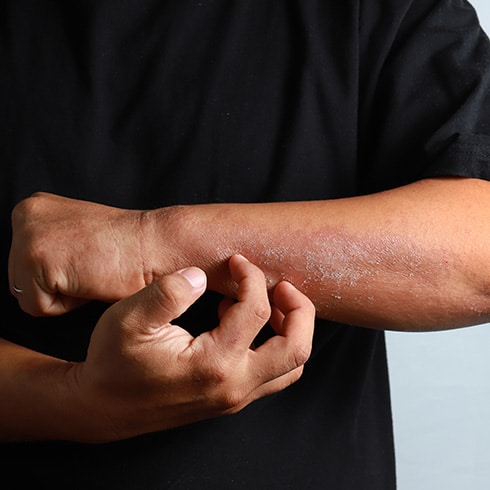What is Atopic Dermatitis?
Atopic dermatitis, also called eczema or atopic eczema, is a common skin condition that can affect babies, young children, children, teens, and adults. Adult-onset atopic dermatitis can start or worsen in adulthood, even if it was not present in childhood. Common atopic dermatitis symptoms include skin inflammation, itchy skin, scaly skin, dry skin, inflamed skin, and sensitive skin. Scratching eczema will further irritate and inflame the skin, which can cause infections that must be treated with antibiotics.
While there is no cure, and the exact cause of eczema is not yet known, developing atopic dermatitis is believed to be triggered by an overactive immune system that reacts aggressively to irritants. Common triggers of eczema flare-ups may include:
- Synthetic fabrics.
- Chemicals in cleaners and detergents.
- Sweating.
- Stress.
- Temperature changes.
- Food allergies.
- Animal dander.
- And more.
Eczema can look a little bit different for everyone, and flare-ups may not always happen in the same areas. What makes eczema worse for one person may not be the same for another. Be sure not to scratch the affected skin skin, as this can lead to open sores and other complications. If you are concerned about open wounds or blisters due to scratching, be sure to see a doctor right away.
How to Diagnose Atopic Dermatitis
Atopic dermatitis is diagnosed primarily through a clinical evaluation by a healthcare provider. The diagnosis is based on a combination of medical history, physical examination, and the presence of characteristic signs and symptoms. There is no single test that confirms atopic dermatitis, so clinicians rely on specific criteria.
In some cases, allergy testing or blood tests may be ordered to rule out other conditions or to identify specific allergens that may be exacerbating symptoms, though these are not required for diagnosis. Patch testing may be considered if allergic contact dermatitis is suspected.
Ultimately, atopic dermatitis is a clinical diagnosis that requires a thoughtful assessment of symptoms over time and in context, rather than a single lab or imaging test.
Eczema FAQs
At what age does eczema go away?
Can eczema be a sign of cancer?
Can eczema be a sign of something else?
Can eczema be caused by hypothyroidism?
Can eczema be caused by stress?
Can eczema make you feel tired?
What are the complications of atopic dermatitis?
What is the difference between allergic contact dermatitis and atopic dermatitis?
Atopic Dermatitis Treatment Options
The treatment option that is right for you will depend on the severity of your eczema symptoms and your lifestyle. Dr. Erwin will carefully assess your skin to determine the best treatment option for you. Some of the most popular atopic dermatitis treatments include:
Medications
Antihistamines
Over-the-counter antihistamines may help to relieve itching of the skin. They work by blocking histamine, which causes allergic reactions.
Steroids
Steroid creams and ointments can also relieve itching and scaling. In more severe cases, oral corticosteroids may be prescribed.
Immunosuppressants
These prescription medications prevent the immune system from overreacting, preventing flare-ups. There is also a new medication available called Dupixent, that may be appropriate.
Therapies
Another treatment option may include light therapy, or phototherapy, which uses ultraviolet light to help prevent immune system responses. A series of treatments are often needed to see results.
Lifestyle Changes
Changes in your lifestyle can help to improve symptoms, as stress can make symptoms worse. Some ways to reduce stress include:
- Deep breathing exercises.
- Meditation.
- Yoga.
- Listening to relaxing music.
- Getting enough sleep.
Cold compresses and soaking in a lukewarm bath can also help to alleviate itching. Also, avoid harsh soaps and skincare products that may disrupt the skin’s barrier function. Ask Dr. Erwin about other lifestyle changes that may be helpful.
Ideal Candidates for Atopic Dermatitis Treatment
Anyone with eczema who has symptoms that are bothersome, uncomfortable, or disrupts their daily activities can often benefit from atopic dermatitis treatment. The best way to determine which treatment option is the best for you will be through an appointment with Dr. Erwin, during which she will assess your eczema and symptoms.
Contact Us Today
If you would like to learn more about available atopic dermatitis treatments, contact our office by calling 979-543-9933! We will assist you in scheduling your appointment with Dr. Erwin, which is your first step toward treatment. During your appointment, you will be able to speak with Dr. Erwin regarding your symptoms and concerns, and she will assess your skin to properly diagnose and treat you.

